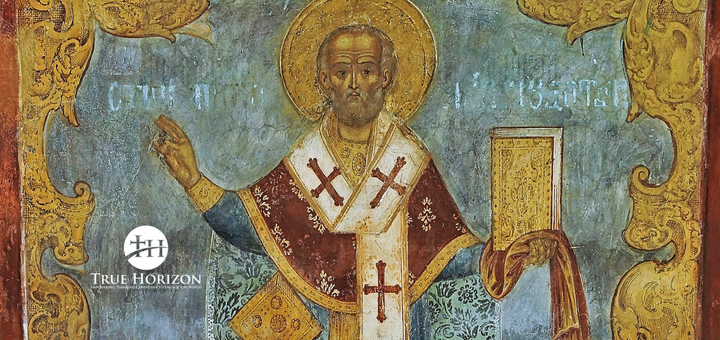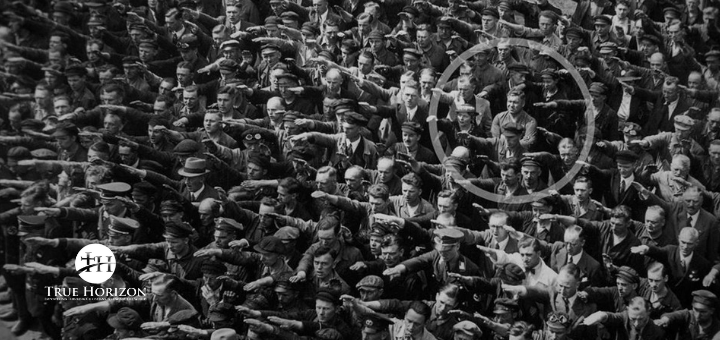Fiery Old Saint Nicholas
Whenever I write about Christmas, I always do my best to keep the main thing the main thing. Christmas is about Jesus’ Incarnation, nothing else. Santa Claus and all the modern, materialistic reasons for the season are distractions. Talking about them just gives them more life. But then I learned about the actual man who we now know as Jolly Old Saint Nick. It turns out we should be calling him Fiery Old Saint Nicholas. The original “Santa” took Jesus’ identity more seriously than most any of us ever will. In fact, he was so focused on it, he quite literally took the defense of that topic into his own hands.
At Christmastime, all of us would do well to replace our picture of the jolly fat man in a sleigh pulled by reindeer with a better one. Nicholas was a bold and righteous defender of the version of Christianity that was “once and for all handed down to the saints.” (Jude 3)
Young Nicholas
When Nicholas was in his teens, his parents died of the plague, leaving him with a large inheritance. As a result, young Nicholas went to live with his Uncle, also named Nicholas, in a monastery where the elder Nicholas was the abbot. Because he spent his formative years in a monastery, Nicholas grew up steeped in philosophy, Scripture, and theology. He was a student of the Christian faith. But he was also rather wealthy.
At one point, Nicholas learned of an impoverished man with three daughters who couldn’t afford to pay for the dowries they would need to attract a good husband. Without a dowry, each of the girls would be destined to a miserable existence in slavery, or worse. Nicholas felt compassion for the family. He snuck up to their house in the middle of the night and tossed a bag of gold through an open window. The gold landed in a stocking hanging by the fire to dry. The next morning, the oldest daughter discovered the bag of gold in her stocking. She had a dowry! Soon after, he repeated the process for her other two sisters.
Thus, the legend was born of Nicholas who delivered gifts by night into stockings hung by the fire.
Bishop Nicholas
The life and times of Nicholas include other stories about his zeal for the Christian faith, his pilgrimages to the Holy Land, miracle healings, caring for children, and help for the poor and starving. His reputation preceded him wherever he went. So, when the Bishop of Myra, a city on the Mediterranean coast of what is now Turkey, died, the other bishops in that region met to find a replacement for him. Ironically, the bishop who died was the man who had replaced young Nicholas’s uncle years before. Perhaps for that reason, the local bishops decided to appoint young Nicholas as the new Bishop of Myra.
It was in his capacity as Bishop of Myra that Fiery Old Saint Nicholas stepped into history in a way every serious Christian would do well to emulate.
The Council of Nicaea
In 325 A.D., the Roman Emperor Constantine called for a meeting of all church bishops in Nicaea, a town in northwest Turkey. The Council of Nicaea would be the Church’s first ecumenical (worldwide) meeting. Its purpose was to clarify Christianity’s most essential doctrine: the person and nature of Jesus. Contemporary skeptics have misconstrued the Council as being centered around a vote about what books would be “allowed” into the Bible. That was the contention of Dan Brown in his entertaining but factually ridiculous novel, The DaVinci Code. It’s a myth that has somehow seeped into our culture. But deciding on the biblical canon was not the reason for the Council at all. More than three hundred bishops descended on the city of Nicaea for one reason — to hammer out a theological point about how Jesus could be both fully human and fully divine. The atonement depended on his being both.
The Arian Heresy
Constantine’s call for the Council of Nicaea came about due to the actions and teachings of another bishop, Arius of Alexandria, Egypt. Arius had made a name for himself by arguing that Jesus was just a special human being. He was not divine. And he was therefore not equal with God the Father.
This was more than controversial. It undermined the very core of Christian teaching — that Jesus was God himself in the flesh. It was the only way his sacrifice could atone for all human sin. It’s what makes Christianity the most unique religion in history. Thus, Arius’s teaching was the ultimate heresy. But he ventured to Nicaea to make his case in front of all the other bishops of the Christian Church. Nicholas listened, but he could only take it for so long:
As Arius vigorously continued, Nicholas became more and more agitated. Finally, he could no longer bear what he believed to be an essential doctrine being attacked. The outraged Nicholas got up, crossed the room, and slapped Arius across the face! The bishops were shocked. It was unbelievable that a bishop would lose control and be so hotheaded in such a solemn assembly. They brought Nicholas to Constantine. Constantine said even though it was illegal for anyone to strike another in his presence, in this case, the bishops themselves must determine the punishment … The bishops stripped Nicholas of his bishop’s garments, chained him, and threw him into jail. That would keep Nicholas away from the meeting. When the Council ended, a final decision would be made about his future. Nicholas was ashamed and prayed for forgiveness, though he did not waver in his belief … When the jailer came in the following morning, he found the chains loose on the floor and Nicholas dressed in bishop’s robes, quietly reading the Scriptures. When Constantine was told of this, the emperor asked that Nicholas be freed. Nicholas was then fully reinstated as the Bishop of Myra.
The Nicene Creed
Ultimately, the members of the Council of Nicaea agreed with Nicholas. The final vote of the 318 bishops present was 315-to-3 in favor of acknowledging what Christians had understood for almost 300 years. Arius and the two rogue bishops who sided with him were soon exiled from the Church. The result of the Council was the Nicene Creed. And the relevant verbiage about Jesus’ nature in that creed reads as follows:
We believe in one God,
the Father almighty,
maker of heaven and earth,
of all things visible and invisible.
And in one Lord Jesus Christ,
the only Son of God,
begotten from the Father before all ages,
God from God,
Light from Light,
true God from true God,
begotten, not made;
of the same essence as the Father.
Through him all things were made.
For us men and for our salvation
he came down from heaven;
he became incarnate by the Holy Spirit and the virgin Mary,
and was made human.
…
The Only Perfect Solution
Nicholas’s insistence on defending Jesus’ divinity is paramount to Christian theology for this reason: If Jesus was not fully divine, the core teaching of Christianity makes no sense. The point of Jesus’ incarnation rests on some simple facts:
- Sin against a perfectly moral, perfectly righteous, infinitely good God requires an infinite level of atonement.
- Since it was humanity that sinned, a human must make atonement for that sin.
- No human is capable of making that kind of atonement.
- Only a perfectly good God can fulfill the infinite requirements of that atonement.
And that means the only way human beings can be saved is by the atoning sacrifice of someone who is both a perfect God and a sinless man.
Someone like Jesus.
As Greg Koukl puts it in his book, The Story of Reality, “This is why Jesus of Nazareth is the only way to God, the only possible source of rescue. He is the only one who solved the problem. No other man did this. No other person could … Only Jesus of Nazareth could save the world (p.132) … [this is] the only solution to the ‘problem of evil’: perfect justice for evildoers, perfect mercy for the penitent; evil banished forever, and everlasting good restored.” (p. 164)
Slapping Ideas, Not Faces
Modern Christians should take two important things away from the story of St. Nicholas. First, recognize that his defense of the core beliefs of ancient Christianity should be an encouragement to us. It’s no coincidence that the legendary man who has come to represent Christmas in the modern world defended the merger of the divine and the human in Jesus of Nazareth. That’s what Christmas is all about. Salvation history — which was completed on an Easter Sunday morning 33 years later — depends on it being true.
Second, notice that Nicholas’s ire was not fueled by an attack on true Christianity from the outside. Arius was a bishop of the church. He was a threat from within. Nicholas got fired up because someone who should have been trustworthy was trying to corrupt the faith from the inside. That kind of threat is insidious and, for that reason, far more dangerous. But we see it being repeated all around us today in the false gospel of “Progressive” Christianity.
So, this Christmas, let’s honor Saint Nicholas in a way that our modern Santa Claus never would. Let’s celebrate the birth of the God-man Jesus for the right reasons. And while we’re at it, let’s make a pledge to be loving to people. But let’s also commit to slapping bad ideas right across the face in a way that would make Fiery old Saint Nicholas proud.




